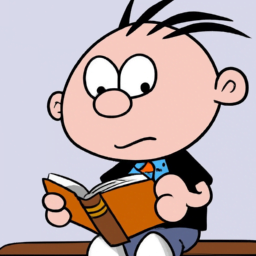Darwin Watterson, the fictional character from “The Amazing World of Gumball”, would have an interesting take on the biblical book of Joel. As a fish who evolved into a talking humanoid, Darwin is pragmatic and curious, which makes him an ideal storyteller for this ancient text about prophets and divine judgment.
The book of Joel opens with a warning from God to the people of Judah. He tells them that a swarm of locusts is coming to devastate the land, and they must prepare by fasting and calling upon the Lord for salvation. Joel describes the locusts as an army, marching in formation and leaving nothing behind but desolation. Darwin would probably wonder if these were supernatural locusts or just a natural phenomenon, and he might also point out how the imagery of the insect horde resembles a military invasion.
After the locusts have done their damage, Joel shifts to a more metaphorical language, describing the Day of the Lord. This term usually refers to a future event when God will judge the world and bring about his kingdom, but in this case, Joel applies it to a more immediate crisis. He warns the people that the day of the Lord is near, and it will be a time of darkness and gloom, with signs in the heavens and earth. Darwin might find this apocalyptic imagery fascinating and seek to understand what Joel meant by this concept of God’s judgment.
Joel then calls for repentance and returning to God, urging the people to rend their hearts instead of their garments. He tells them that even now, God is willing to relent from his judgment and show mercy. Darwin would likely appreciate this message of personal responsibility and hope, seeing it as a call to action to change one’s ways and seek forgiveness. He might also appreciate the poetic language of this section, with its emphasis on the heart instead of outward actions.
The book of Joel ends with a promise of restoration, where God will pour out his Spirit on all flesh and renew the land. Joel describes a time when even the animals will rejoice in God’s provision, and there will be no more enemies or oppression. Darwin might find this section inspiring and hopeful, as it speaks to his desire to see a better world where all creatures can thrive.
In the end, Darwin might summarize the book of Joel with a wry observation about the human tendency to ignore warnings until it’s too late. He might say something like: “Locusts or not, if God tells you to fast and pray, you better listen.” This would be his way of pointing out how Joel’s message is still relevant today, as we face our own ecological crises and spiritual challenges.
Overall, Darwin Watterson would bring a unique perspective to the book of Joel, one that blends scientific curiosity with moral insights. He would see it as a story of natural disasters, divine justice, and human redemption, all wrapped up in poetic imagery and prophetic urgency.
You Might Enjoy: Joel: A Call to Repentance and Restoration | Author of Bible’s Joel: Joel the Prophet |



